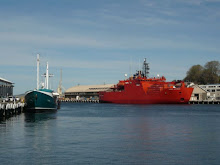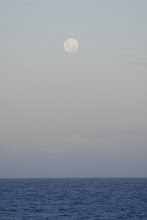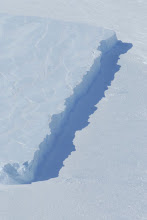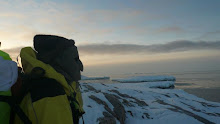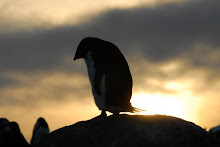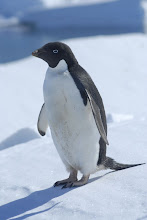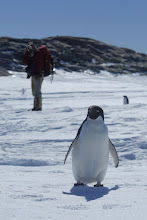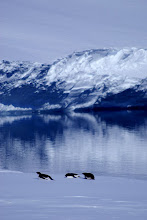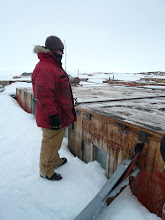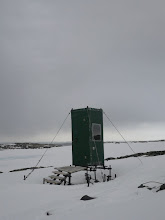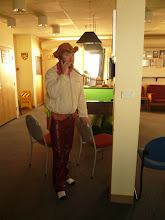 The days are getting much shorter now at Casey. After losing something close to one hour each week around the Autumnal Equinox (March 22nd), the rate of change is now slowing down so that 7 days from now we will have just 40 minutes less daylight than we do today. Come June 22 (the Winter Solstice) we will have just two and a half hours of light each day (presuming it isn’t cloudy).
The days are getting much shorter now at Casey. After losing something close to one hour each week around the Autumnal Equinox (March 22nd), the rate of change is now slowing down so that 7 days from now we will have just 40 minutes less daylight than we do today. Come June 22 (the Winter Solstice) we will have just two and a half hours of light each day (presuming it isn’t cloudy).  But for the most part we have been very lucky with the weather so far. For a few weeks after the ship left we had lots of low cloud, and not much sunshine, but generally light winds. A little way into March though, the cloud disappeared (probably went to somewhere like Mawson or Davis), and we were treated to two or three weeks of fine and sunny weather. The clear night skies here are great, and even better when you get to see something like this…
But for the most part we have been very lucky with the weather so far. For a few weeks after the ship left we had lots of low cloud, and not much sunshine, but generally light winds. A little way into March though, the cloud disappeared (probably went to somewhere like Mawson or Davis), and we were treated to two or three weeks of fine and sunny weather. The clear night skies here are great, and even better when you get to see something like this…


 As much as I like these photos however, I will admit that they give a somewhat warped idea of reality. While nothing can really compare to watching this light show in person, the necessarily long exposure of the camera, 40 seconds or more, definitely enhances the colour. To give you an idea, the snowy foreground was almost pitch black to the naked eye, but the camera picks up the colour very well.
As much as I like these photos however, I will admit that they give a somewhat warped idea of reality. While nothing can really compare to watching this light show in person, the necessarily long exposure of the camera, 40 seconds or more, definitely enhances the colour. To give you an idea, the snowy foreground was almost pitch black to the naked eye, but the camera picks up the colour very well. 
 I must have stood outside (in –15C or so, which isn’t really that cold unless you’re standing still taking photos) for over an hour that night (I was excited), but the aurora itself actually lasted for 3 nights (albeit faintly). The third night of which Craig and I had decided to ski to Wilkes again.
I must have stood outside (in –15C or so, which isn’t really that cold unless you’re standing still taking photos) for over an hour that night (I was excited), but the aurora itself actually lasted for 3 nights (albeit faintly). The third night of which Craig and I had decided to ski to Wilkes again.Although due to the shorter days we no longer have the luxury of choosing to travel at any hour of the day, we set off this evening after work and were aided by the recently full moon. By the by, you will have to wait another 10 years for a full moon on the Autumnal Equinox… for those who are interested.
 This was to be my second visit to the Hilton in a week – a place that for me is becoming a home away from home away from home… Whats more, it was to be my third jolly in as many weeks, after a trip to Jack’s Donga the previous weekend. Its hard to resist the only wood fire in all of the Australian Antarctic Territory.
This was to be my second visit to the Hilton in a week – a place that for me is becoming a home away from home away from home… Whats more, it was to be my third jolly in as many weeks, after a trip to Jack’s Donga the previous weekend. Its hard to resist the only wood fire in all of the Australian Antarctic Territory.  What I particularly like about visiting these huts is that it gives you an idea of what it was like for the real explorers… even if its just an idea. We live in such comfort and luxury that I can sit at my window in the evening, reading a book with a cup of tea, and 2 feet away, on the other side of the window, the temperature can easily be 30C or 40C lower and blowing 30 knots. If you forget how things freeze here, and how quickly you can get cold outside, visiting these huts if a nice reminder.
What I particularly like about visiting these huts is that it gives you an idea of what it was like for the real explorers… even if its just an idea. We live in such comfort and luxury that I can sit at my window in the evening, reading a book with a cup of tea, and 2 feet away, on the other side of the window, the temperature can easily be 30C or 40C lower and blowing 30 knots. If you forget how things freeze here, and how quickly you can get cold outside, visiting these huts if a nice reminder.  We turn the bar-heaters in the huts off at night for safety reasons, and at Wilkes the fire will go out. Ventilation means that by the time you wake up in the morning the hut has more or less dropped to ambient outside temperatures (-10C or so), and it will be a while before it heats up again. But for us this is just one night in many, for Scott it was every night, and he didn’t have bar-heaters…
We turn the bar-heaters in the huts off at night for safety reasons, and at Wilkes the fire will go out. Ventilation means that by the time you wake up in the morning the hut has more or less dropped to ambient outside temperatures (-10C or so), and it will be a while before it heats up again. But for us this is just one night in many, for Scott it was every night, and he didn’t have bar-heaters…  But the wood fire isn’t all I like about Wilkes. It is, as I have mentioned before, a historical site, quite literally frozen in time.
But the wood fire isn’t all I like about Wilkes. It is, as I have mentioned before, a historical site, quite literally frozen in time. 
In summer, this (above) was a shallow melt pond at Wilkes. A few inches bellow the surface are planks of wood, tin cans, metal pipes, and other bits and pieces. It’s a black and white photographer’s dream… and a nice place for a novice like myself to try shooting off a few too.
It’s a black and white photographer’s dream… and a nice place for a novice like myself to try shooting off a few too. 
 My take on Wilkes is this: it was positioned terribly by the Americans, who seemed to have landed in Newcomb Bay and thought “right, where is the most snow accumulating, the most wind blowing, and generally the worst looking area?” and started building at Wilkes. They then got sick of digging the station out of the snow every time there was a puff of wind, and gave over power to the Australians.
My take on Wilkes is this: it was positioned terribly by the Americans, who seemed to have landed in Newcomb Bay and thought “right, where is the most snow accumulating, the most wind blowing, and generally the worst looking area?” and started building at Wilkes. They then got sick of digging the station out of the snow every time there was a puff of wind, and gave over power to the Australians.  After about a decade (50s or 60s I think) they too got sick of it and decided to pack up and leave. No… wait a minute… they didn’t pack up anything, they just left! As I am going to do now. Arrivederci!
After about a decade (50s or 60s I think) they too got sick of it and decided to pack up and leave. No… wait a minute… they didn’t pack up anything, they just left! As I am going to do now. Arrivederci!
 It’s a black and white photographer’s dream… and a nice place for a novice like myself to try shooting off a few too.
It’s a black and white photographer’s dream… and a nice place for a novice like myself to try shooting off a few too. 
 My take on Wilkes is this: it was positioned terribly by the Americans, who seemed to have landed in Newcomb Bay and thought “right, where is the most snow accumulating, the most wind blowing, and generally the worst looking area?” and started building at Wilkes. They then got sick of digging the station out of the snow every time there was a puff of wind, and gave over power to the Australians.
My take on Wilkes is this: it was positioned terribly by the Americans, who seemed to have landed in Newcomb Bay and thought “right, where is the most snow accumulating, the most wind blowing, and generally the worst looking area?” and started building at Wilkes. They then got sick of digging the station out of the snow every time there was a puff of wind, and gave over power to the Australians.  After about a decade (50s or 60s I think) they too got sick of it and decided to pack up and leave. No… wait a minute… they didn’t pack up anything, they just left! As I am going to do now. Arrivederci!
After about a decade (50s or 60s I think) they too got sick of it and decided to pack up and leave. No… wait a minute… they didn’t pack up anything, they just left! As I am going to do now. Arrivederci!

